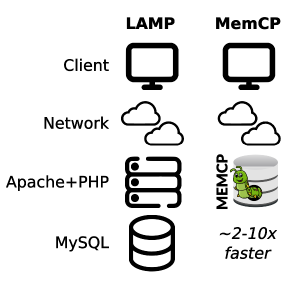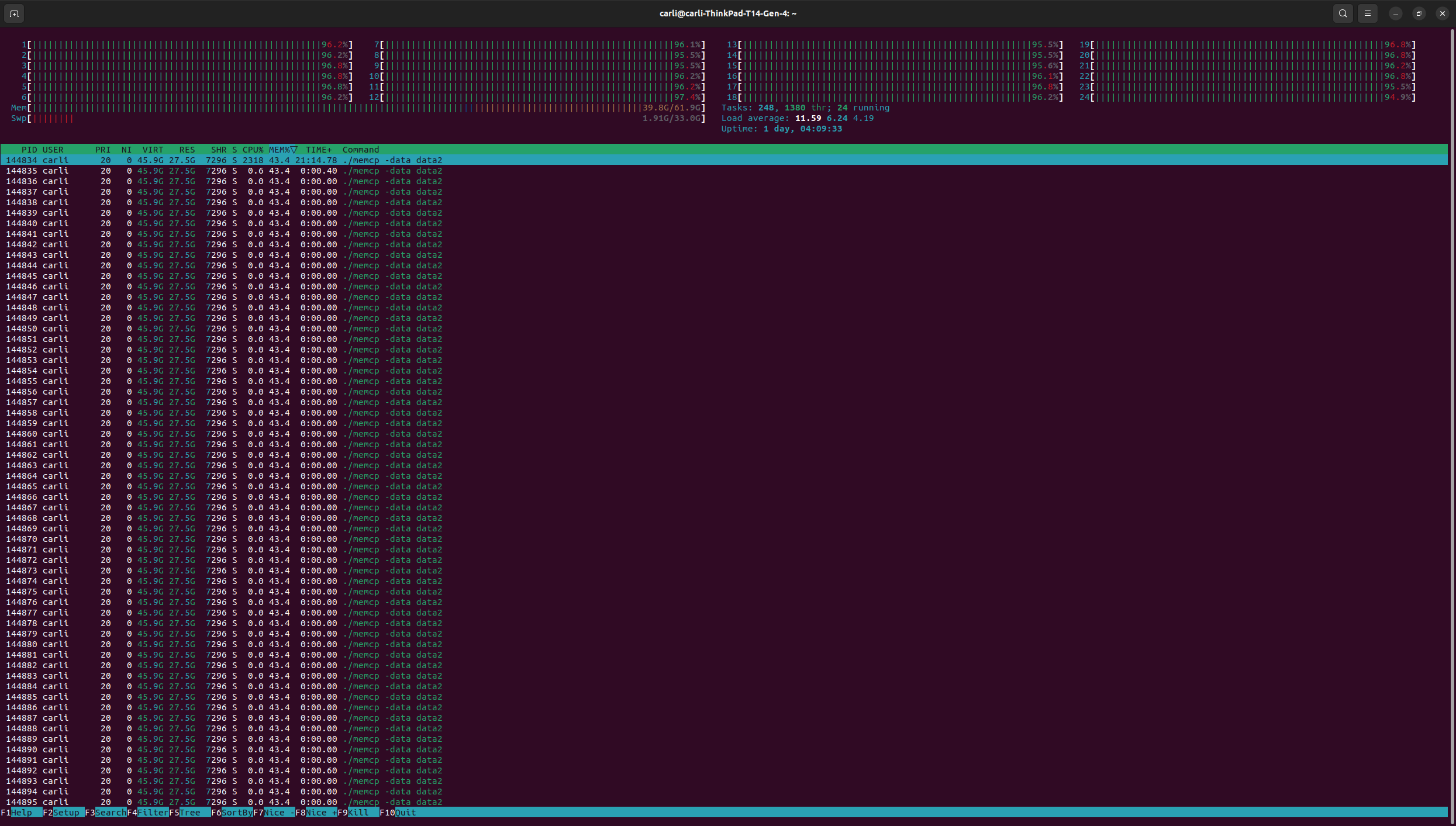Main Page
🚀 Meet MemCP – The MySQL Alternative You've Been Waiting For
Tired of outdated database engines slowing you down?
MemCP is a blazing-fast, in-memory, column-oriented database designed for modern workloads. It delivers unmatched speed, massive compression, and built-in REST APIs – all with a developer-friendly open-source stack.
Replace MySQL with something better. Something built for the 2020s – not stuck in 2005.
⚡ Why Developers Choose MemCP
✅ Turbocharged Performance
Designed for multicore CPUs, modern caches, and NVMe SSDs – MemCP handles analytical (OLAP) and transactional (OLTP) workloads at lightning speed.
✅ 80% Smaller Data Footprint
Columnar storage means smarter compression. Typical use cases shrink data 5× smaller than MySQL – with no effort from your side.
✅ Simple JSON APIs Built-in
Query your data with RESTful endpoints – no middleware, no ORM overhead. Just fast results, directly from the DB.
✅ Familiar SQL-like Structure – Zero Lock-In
You don’t need to re-learn everything. Tables, schemas, and logic follow familiar patterns – just modernized and optimized.
✅ Zero-Config Installation
Spin up MemCP with a single docker run or pm2 start. Start building in minutes.
🧑💻 Built for Developers, by Developers
MemCP was made for the people who write real-world code, not just benchmark reports. Whether you're building a SaaS product, IoT platform, or data-heavy analytics dashboard, MemCP gives you the speed and flexibility you need to scale.
# Ready to try it? git clone https://github.com/launix-de/memcp cd memcp go get make pm2 start ./memcp ./data/ mysql -u root -p -P 3307 Enter password: admin
🆚 MemCP vs MySQL: The Key Differences
| Feature | MySQL | MemCP |
|---|---|---|
| Storage Model | Row-based | Column-based (compressed) |
| Performance | Good | Excellent (NUMA-optimized) |
| In-Memory Capable | Limited | Yes, by default |
| REST API Integration | External services | Built-in |
| Installation Footprint | ~150MB+ | ~10MB |
| Open Source | ✅ | ✅ |
💡 Ideal Use Cases
- High-speed dashboards & real-time analytics
- Embedded systems with minimal resources
- Data-heavy SaaS backends
- Replacing outdated MySQL deployments with modern performance
🧪 Try MemCP Today
Explore the documentation, check out the GitHub repo, and join a growing community of developers building fast, efficient, modern systems with MemCP.
Ditch the legacy. Embrace performance. Make the switch to MemCP.
What is memcp?
memcp is an open-source, high-performance, columnar in-memory database that can handle both OLAP and OLTP workloads. It provides an alternative to proprietary analytical databases and aims to bring the benefits of columnar storage to the open-source world.
memcp is written in Golang and is designed to be portable and extensible, allowing developers to embed the database into their applications with ease. It is also designed with a focus on scalability and performance, making it a suitable choice for distributed applications.
Features
- fast: MemCP is built with parallelization in mind. The parallelization pattern is made for minimal overhead.
- efficient: The average compression ratio is 1:5 (80% memory saving) compared to MySQL/MariaDB
- modern: MemCP is built for modern hardware with caches, NUMA memory, multicore CPUs, NVMe SSDs
- versatile: Use it in big mainframes to gain analytical performance, use it in embedded systems to conserve flash lifetime
- Columnar storage: Stores data column-wise instead of row-wise, which allows for better compression, faster query execution, and more efficient use of memory.
- In-memory database: Stores all data in memory, which allows for extremely fast query execution.
- Build fast REST APIs directly in the database (they are faster because there is no network connection / SQL layer in between)
- OLAP and OLTP support: Can handle both online analytical processing (OLAP) and online transaction processing (OLTP) workloads.
- Compression: Lots of compression formats are supported like bit-packing and dictionary encoding
- Scalability: Designed to scale on a single node with huge NUMA memory
- Adjustable persistency: Decide whether you want to persist a table or not or to just keep snapshots of a period of time
https://www.youtube.com/watch?v=g29FR4Jwius
Introduction
- What is OLTP and OLAP
- History of the MemCP project
- Hardware Requirements
- Persistency and Performance Guarantees
- Current Status and Open Issues
- Comparison: MemCP vs. MySQL
Getting Started
Administration
- Deployment
- Migration from MySQL and PostgreSQL
- Settings
- Process Hibernation
- Performance Measurement
- MemCP Console
Frontends
SQL Frontend
- Supported SQL
- Advanced SQL Tutorial
- SQL over REST
- Supported Tooling
- How SQL Operators are implemented on MemCP
RDF Frontend
Custom Frontends
Internals
How things work in MemCP
- Databases, Tables and Columns
- Shards, RecordIDs, Main Storage, Delta Storage
- Columnar Storage
- Transactions
Optimizations
- In-Memory Compression, Columnar Compression Techniques
- Temporary Columns
- Data Auto Sharding and Auto Indexing
- Parallel Computing
Further Reading
Scientific
- VLDB Research Paper
- LNI Proceedings Paper
- TU Dresden Research Paper
- Large Graph Algorithms
- https://wwwdb.inf.tu-dresden.de/research-projects/eris/
How MemCP was built
- Balancing OLAP and OLTP Workflows
- Designing Programming Languages for Distributed Systems
- Columnar Storage Interface in Golang
- Impact of In-Memory Compression on Performance
- Memory-Efficient Indices for In-Memory Storages
- Compressing Null Values in Bit-Compressed Integer Storages
- Improving Golang HTTP Server Performance
- Benchmarking SQL Databases
- Writing a SQL Parser in Scheme
- Accessing memcp via Scheme
- First SQL Query in memcp
- Sequence Compression in In-Memory Database
- Storing Data Smaller Than One Bit
- memcp Announcement Video


